Plenary Sessions
Plenary #1a: Readying the Ground: Religion, Education, Violence – “My God, What Have We Done?”
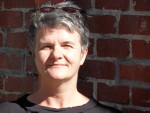 Andrea Bieler is Professor of Practical Theology at the Kirchliche Hochschule in Wuppertal/Bethel in Germany. Her research interests are: ritualizing memory, illness narratives and pastoral care, practical theology in intercultural and global perspective. Among her various publications is the co-edited volume After Violence: Religion, Trauma, and Reconciliation (Leipzig: Evangelische Verlagsanstalt 2011).
Andrea Bieler is Professor of Practical Theology at the Kirchliche Hochschule in Wuppertal/Bethel in Germany. Her research interests are: ritualizing memory, illness narratives and pastoral care, practical theology in intercultural and global perspective. Among her various publications is the co-edited volume After Violence: Religion, Trauma, and Reconciliation (Leipzig: Evangelische Verlagsanstalt 2011).
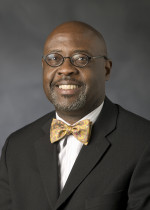 Willie James Jennings is Associate Professor of Theology and Black Church Studies at Duke Divinity School. He teaches in the areas of systematic theology and black church and cultural studies. The author of numerous articles, his research interests include these areas as well as liberation theologies, cultural identities, and anthropology. His latest book is The Christian Imagination: Theology and the Origins of Race (2011).
Willie James Jennings is Associate Professor of Theology and Black Church Studies at Duke Divinity School. He teaches in the areas of systematic theology and black church and cultural studies. The author of numerous articles, his research interests include these areas as well as liberation theologies, cultural identities, and anthropology. His latest book is The Christian Imagination: Theology and the Origins of Race (2011).
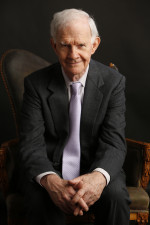 Gabriel Moran is Professor Emeritus in the department of Humanities and the Social Sciences, New York University. He has served on the board of directors of the Religious Education Association and the International Seminar on Religious Education and Values; he was president of the Association of Professors and Researchers in Religious Education. Among his many books is Living Nonviolently: Language for Resisting Violence (2011).
Gabriel Moran is Professor Emeritus in the department of Humanities and the Social Sciences, New York University. He has served on the board of directors of the Religious Education Association and the International Seminar on Religious Education and Values; he was president of the Association of Professors and Researchers in Religious Education. Among his many books is Living Nonviolently: Language for Resisting Violence (2011).
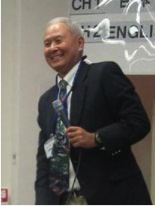 Roy Tamashiro is professor in the Multidisciplinary Studies Department at Webster University, St. Louis, Missouri. His scholarship spans multiple disciplines including developmental psychology, educational foundations, curriculum and pedagogy, international studies, educational technology, peace and conflict studies. One of his recent projects about a Hiroshima A-Bomb survivor meeting the co-pilot of the Enola Gay (the B-29 that dropped the bomb) is described in paper titled “My God, What have We Done? The Intersection of Personal & Societal Transformation.”
Roy Tamashiro is professor in the Multidisciplinary Studies Department at Webster University, St. Louis, Missouri. His scholarship spans multiple disciplines including developmental psychology, educational foundations, curriculum and pedagogy, international studies, educational technology, peace and conflict studies. One of his recent projects about a Hiroshima A-Bomb survivor meeting the co-pilot of the Enola Gay (the B-29 that dropped the bomb) is described in paper titled “My God, What have We Done? The Intersection of Personal & Societal Transformation.”
Plenary #1b: Remembering, Reflecting, Repenting: Memory, Imagination, and Human Rights
The afternoon plenary will be a continuation of the morning plenary.
Plenary #2: Reinterpreting, Re-Searching: Interrupting Violence on the Ground
Plenary #2 offers an opportunity for conference participants to (re)search and (re)interpret issues of violence on the ground through site visits and interactive engagement. This is an invitation for RE scholars to truly “go into the field” and put our ears to the ground, for a sense of the impulses of violence and the vibrant pulses of active work of intervention and prevention.
For this plenary, we have invited four (4) local faith- and community-based ORGANIZATIONS which have done outstanding educational and activist work related to violence in the neighborhoods of Chicago. Three (3) organizations will host conference participants at their respective off-site locations, and one (1) organization will hold an interactive session on-site (at the hotel). Conference participants are invited to CHOOSE ONE from among the four. Individuals who choose the off-site options will gather as groups (with designated facilitators) to visit the locations by chartered bus. (For this reason, we ask for an additional $10 contribution on your registration form to off-set bus rental costs.)
We will all gather as a “plenary” at 9:00AM on Saturday, with brief introductions and orientation. Thereafter, we will disperse into respective groups based on options selected.
ON-SITE OPTION A: Shanta Premawardhana, Churches, Theology and the Economics of Urban Violence (SCUPE) – Bob O’Gorman, facilitator
An interactive session with Shanta Premawardhana, President of the Seminary Consortium for Urban Pastoral Education (SCUPE), which provides M.Div. level courses in urban contextual theology to its twelve member seminaries. SCUPE specializes in African-centric and Latino/a theological education and community development. Its 2014 Congress on Urban Ministry, held in partnership with Interfaith Worker Justice, addressed local/global economic justice issues. Originally from Sri Lanka, Premawardhana was most recently the director for the program Interreligious Dialogue and Cooperation at the World Council of Churches (WCC). He arrived in the United States in 1981 for graduate study at Northwestern University where he earned his M.A. and Ph.D. in Religion. He served for fourteen years as senior pastor of Ellis Avenue Church located in the south side of Chicago.
OFF-SITE OPTION B: John Marshall Law School, Restorative Justice Project (RJP)
Leah Gunning Francis and Siebren Miedema, facilitators
How should communities address the injuries, disruptions to peace of mind, and other losses of victims of crime? How can harmony be restored after experiences of discord? These are questions of restorative justice. Participants in this site visit will learn about restorative justice and discuss initiatives to teach it, especially in elementary and high schools, as a means of nonviolent conflict resolution. Participants will also explore how restorative justice can heal the wounds of people and communities traumatized by violence and can keep people from falling into the school to prison pipeline.
OFF-SITE OPTION C: Precious Blood Ministry of Reconciliation (PBMR)
Ernest Miller and Harold (Bud) Horell, facilitators
What would it look like to have a ministry whose purpose was to work for healing and reconciliation in the midst of violence and alienation? When a few pastoral ministers sat down and discussed this question in 2000, the dream of PBMR was born. Participants in this site visit will discuss PBMR’s current initiatives, such as their “making choices program” for at risk inner city youth, “restorative justice and peacemaking circles,” “peace and education coalition” and other neighborhood community programs, and “hope and healing outreach” to accompany families and individuals impacted by violence.
OFF-SITE OPTION D: Southwest Organizing Project (SWOP) – Susanne Johnson, facilitator
SWOP organizes neighborhoods in Chicago’s Southwest side (home of 20 active gangs) to prevent/reduce violence through the Ceasefire initiative—the Chicago affiliate of the nationwide Cure Violence program. CeaseFire uses a team of street-wise “violence interrupters” and outreach workers, many of whom are ex-gang members and ex-prison inmates, who mitigate conflict on the street before its turns violent. The scientifically proven program is based on five working components: direct youth outreach; public education around violence and its consequences; community mobilization, faith-based leader involvement, and effective police relations. (The 2011 documentary “The Interrupters” highlights the work of CeaseFire).
Plenary #3: Recovering, Remaking, Resurrecting: “Unveiled”
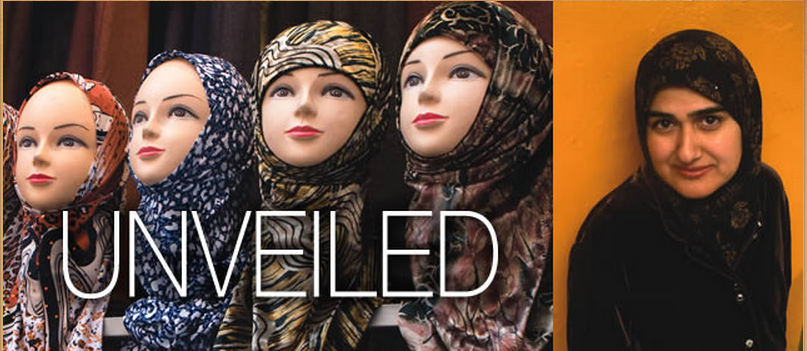 Racism. Hate crimes. Love. Islam. Culture. Language. Life.
Racism. Hate crimes. Love. Islam. Culture. Language. Life.
Five Muslim women
in a post-9/11 world
serve tea and uncover what lies beneath the veil in this compelling one-woman show.
UNVEILED, a one woman play written and performed by Rohina Malik, had its World Premiere in May 2009 at the 16th Street Theater. Directed by Ann Filmer, it received critical acclaim, and the entire run and extension were sold out. UNVEILED received a second production at the Tony Award Winning Victory Gardens Theater in April 2010, a third production at Next Theater in Evanston, in September 2010 and its fourth production at Brava Theater, San Francisco, September 2011. Recently, UNVEILED was presented at Theater Project, Baltimore. Rohina has been invited to perform UNVEILED at universities, churches, mosques, synagogues and theaters.
Rohina Malik is a Chicago-based playwright, actress and solo performance artist. She was born and raised in London, England, of South Asian heritage. Rohina is a resident playwright at Chicago Dramatists, an artistic associate at the 16th Street Theater, and she was one of the four writers in the inaugural group of The Goodman Theater’s Playwrights Unit.
Plenary #4: Tribute to “Emancipatory Imagination”
In this final plenary, Program Chair and President-Elect Mai-Anh Le Tran and Program Chair-Elect and Vice President Harold (Bud) Horell reflect on generative themes emerging from the conference’s collective inquiry, and construct an interpretive bridge between the REA 2014 conference and REA 2015 (Atlanta).
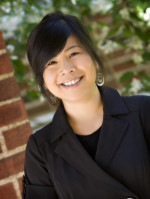 Mai-Anh Le Tran is Associate Professor of Christian Education at Eden Theological Seminary, St. Louis, MO.
Mai-Anh Le Tran is Associate Professor of Christian Education at Eden Theological Seminary, St. Louis, MO.
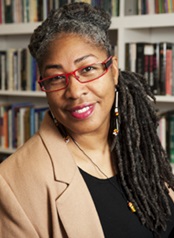 Evelyn L. Parker is Professor of Practical Theology and Associate Dean for Academic Affairs at Perkins School of Theology, Southern Methodist University.
Evelyn L. Parker is Professor of Practical Theology and Associate Dean for Academic Affairs at Perkins School of Theology, Southern Methodist University.
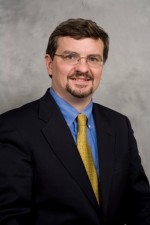 Harold D. Horell is Assistant Professor of Religious Education at the Graduate School of Religion and Religious Education, Fordham University.
Harold D. Horell is Assistant Professor of Religious Education at the Graduate School of Religion and Religious Education, Fordham University.